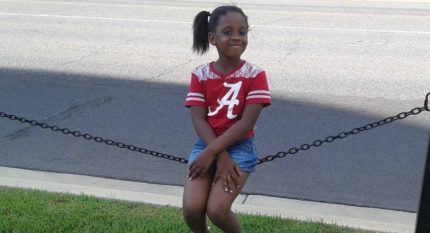
Zecole Thomas and her two children have moved out of California since Joseph Thomas committed suicide. (Image courtesy of USA Today)
It was last August that Zecole Thomas found her husband, self-taught computer engineer Joseph Thomas, dead from a self-inflicted gunshot wound. Now, she’s suing ride-sharing start-up Uber for the intense, stressful work culture she says led to her husband’s death.
Lured by a lucrative $170,000-per-year salary, Joseph Thomas turned down a job at Apple and left his previous work at professional networking firm LinkedIn for the promised wealth and pristine reputation at Uber. Within five months, however, Zecole Thomas said she noticed drastic changes in her husband’s attitude.
“Uber’s culture was different,” she told USA Today. “Here was a man who was very good at what he did, who took care of his family. But, within months, he started to tell me that he ruined our life. That he was broken.”
Joseph Thomas’ tragic death, first reported by the San Francisco Examiner, has led his wife to file a workers’ compensation claim asking that Uber be held responsible for the computer engineer’s mental decline. The request, if granted, would give Thomas’ family access to $720,000 in total workers’ comp that Joseph would’ve automatically received had he stayed on his job six months.
As her husband grew more and more depressed, Zecole Thomas and other family members pressed him to see a therapist. He agreed, but when leaving his job at Uber was suggested, Joseph Thomas replied, “I cannot do it. I cannot think.”
“It’s hard to explain, but he wasn’t himself at all,” Zecole Thomas said. “He’d say things like, ‘My boss doesn’t like me.’ His personality changed totally; he was horribly concerned about his work, to the point it was almost unbelievable. He was saying he couldn’t do anything right.”
Thomas’ father, Joe Thomas, expressed similar concerns about his son’s mental health, saying the once-confident engineer essentially “went down the tubes,” once he started working at Uber.
Similar feelings of intense stress were echoed in a blog post by ex-Uber engineer Susan Fowler, who detailed her experience at the tech company and described it as a toxic and sexist work environment. In the past few months, Uber has been accused of subjecting its employees to verbal abuse and carrying out sketchy business practices designed to deceive regulators, drivers and riders. Now, the company is the focus of an internal investigation led by former U.S. attorney general Eric Holder, according to USA Today.
“If you put a hard-driving person on unrealistic tasks, it puts them in failure mode,” said Joe Thomas, adding that his son described a kind of brainwashing while at Uber. “It makes them burn themselves out; like driving a Lamborghini in first gear.”
Family members also suspect that Joseph Thomas may have experienced racial discrimination at work. According to Uber’s first diversity report, released in March, African-Americans make up just 1 percent of its tech employees and none of the company’s tech leaders are Black.
Uber has sent its condolences to the Thomas family, saying, “No family should go through the unspeakable heartbreak the Thomas family has experienced.” However, it stopped short of granting Zecole Thomas’ benefits claim for workers’ comp. Now, Richard Richardson, whose employment law firm Siegal and Richardson represents the family, is battling with the company to obtain documents necessary to determine the special circumstances needed for the benefits to kick in.
“We think it was stress and harassment induced by his job, between him being one of the few African-Americans there, working around the clock and the culture of Uber,” Richardson told the San Francisco Chronicle. “And he couldn’t talk about it to anyone because of nondisclosure agreements.”
Zecole Thomas said she was baffled by Uber’s denial of the workers’ comp claim for her husband, saying, “He devoted his life to work. … I was sure they would reciprocate.”
Ultimately, the widowed mother of two said she hopes her lawsuit will bring attention to “the fact that engineers and IT workers deserve a better work-life balance.
“The way many of these companies work is they want you to love your job more than your families, with breakfast, lunch and dinner and places to sleep at work,” Zecole Thomas said.
“But people in IT want to have families, too.”


